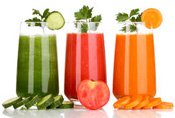
Juices are Condensed Essential Nutrients
When we eat, were usually just looking to satisfy our appetite and stave off hunger—a quick sandwich here, a black-and-white cookie there. As much as two-thirds of the average North American’s caloric intake is sourced from unbeneficial fats, sugar, and refined Hours. When we shortchange our bodies through this kind of “empty calorie” eating and deny ourselves essential nutrients, inevitably we soon feel hungry again. Ultimately, in order to feel “energized,” we end up eating more calories than we need during the day. Juices, on the other hand, are at the opposite end of the spectrum: They are condensed essential nutrients in a low-calorie, liquid form, containing everything the standard American diet lacks. Though it may initially seem odd to think of juice as “food,” anyone who is experienced in juicing will gladly (and, by no coincidence, likely energetically) tell you how remarkably sustained and content they feel after consuming a fresh-pressed beverage.
Liquid Nutrients are Absorbed More Quickly!
This satisfaction is largely due to easy nutrient digestion. The stomach is essentially a blender, and it requires a lot of the body’s energy to break down food (just think of how lethargic you feel after a heavy meal). Not surprisingly, when you consume juice, the breakdown process is reduced dramatically, cutting the time that food stays in the stomach. Liquid nutrients are digested and absorbed more quickly, and this is why you often feel the positive effects of juices right away. Every part of the digestive process is affected: from faster digestive breakdown in the stomach, to rapid absorption into the bloodstream, to more efficient assimilation of nutrients entering cells, and even quicker elimination of toxins and waste by the colon, kidneys, and skin. In short, we become the epitome of a well-oiled machine when we regularly consume fresh juices.
Juices also give us the opportunity to enjoy many of the benefits of highly evolved diets, such as a raw food regimen or a very clean, plant-based, whole food diet, without necessarily having to commit 100%. The American Heart Association recommends a base consumption of at least 8 servings of fresh vegetables and fruits a day—a number that is easily met (or even exceeded) through solely drinking just one or two 8- to 16-ounce glasses of fresh juice. A regular inclusion of juice over a period of a few weeks can create positive changes that you can genuinely both feel and see, and even if your diet is already squeaky clean, all the additional nutrients in juices can only serve to raise your personal bar a bit higher. There’s always room for a little self-improvement, right?
Related Links
Leave A Comment